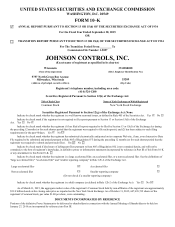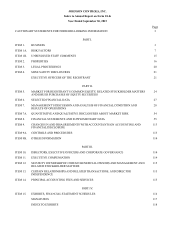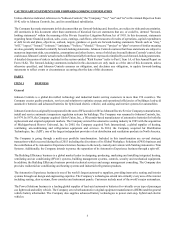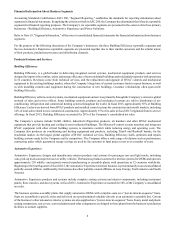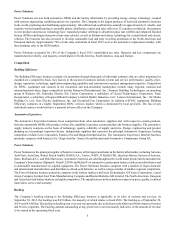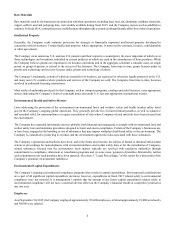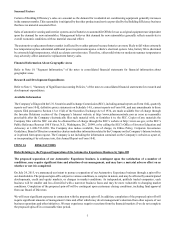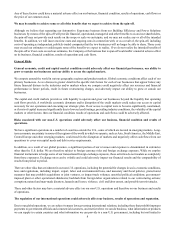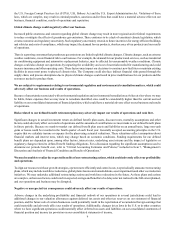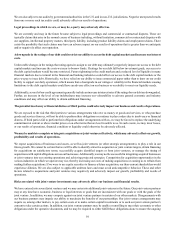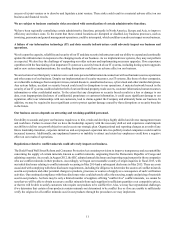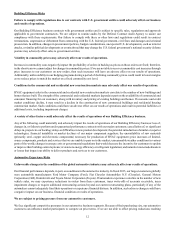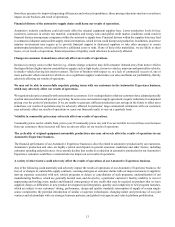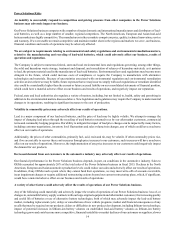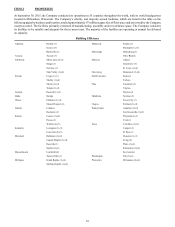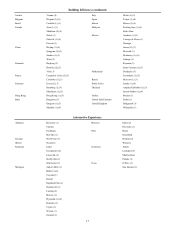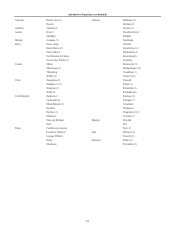Johnson Controls 2015 Annual Report Download - page 8
Download and view the complete annual report
Please find page 8 of the 2015 Johnson Controls annual report below. You can navigate through the pages in the report by either clicking on the pages listed below, or by using the keyword search tool below to find specific information within the annual report.
8
Any of these factors could have a material adverse effect on our business, financial condition, results of operations, cash flows or
the price of our common stock.
We may be unable to achieve some or all of the benefits that we expect to achieve from the spin-off.
Although we believe that separating our Automotive Experience business from our Building Efficiency and Power Solutions
businesses by means of the spin-off will provide financial, operational, managerial and other benefits to us and our shareholders,
the spin-off may not provide such results on the scope or scale we anticipate, and we may not realize any or all of the intended
benefits. In addition, we will incur one-time costs and ongoing costs in connection with, or as a result of, the spin-off, including
costs of operating as independent, publicly-traded companies that the two businesses will no longer be able to share. Those costs
may exceed our estimates or could negate some of the benefits we expect to realize. If we do not realize the intended benefits of
the spin-off or if our costs exceed our estimates, the Company or the business that is spun off could suffer a material adverse effect
on its business, financial condition, results of operations and cash flows.
General Risks
General economic, credit and capital market conditions could adversely affect our financial performance, our ability to
grow or sustain our businesses and our ability to access the capital markets.
We compete around the world in various geographic regions and product markets. Global economic conditions affect each of our
primary businesses. As we discuss in greater detail in the specific risk factors for each of our businesses that appear below, any
future financial distress in the industries and/or markets where we compete could negatively affect our revenues and financial
performance in future periods, result in future restructuring charges, and adversely impact our ability to grow or sustain our
businesses.
The capital and credit markets provide us with liquidity to operate and grow our businesses beyond the liquidity that operating
cash flows provide. A worldwide economic downturn and/or disruption of the credit markets could reduce our access to capital
necessary for our operations and executing our strategic plan. If our access to capital were to become significantly constrained,
or if costs of capital increased significantly due to lowered credit ratings, prevailing industry conditions, the volatility of the capital
markets or other factors; then our financial condition, results of operations and cash flows could be adversely affected.
Risks associated with our non-U.S. operations could adversely affect our business, financial condition and results of
operations.
We have significant operations in a number of countries outside the U.S., some of which are located in emerging markets. Long-
term economic uncertainty in some of the regions of the world in which we operate, such as Asia, South America, the Middle East,
Central Europe and other emerging markets, could result in the disruption of markets and negatively affect cash flows from our
operations to cover our capital needs and debt service requirements.
In addition, as a result of our global presence, a significant portion of our revenues and expenses is denominated in currencies
other than the U.S. dollar. We are therefore subject to foreign currency risks and foreign exchange exposure. While we employ
financial instruments to hedge some of our transactional foreign exchange exposure, these activities do not insulate us completely
from those exposures. Exchange rates can be volatile and could adversely impact our financial results and the comparability of
results from period to period.
There are other risks that are inherent in our non-U.S. operations, including the potential for changes in socio-economic conditions,
laws and regulations, including import, export, labor and environmental laws, and monetary and fiscal policies; protectionist
measures that may prohibit acquisitions or joint ventures, or impact trade volumes; unsettled political conditions; government-
imposed plant or other operational shutdowns; backlash from foreign labor organizations related to our restructuring actions;
corruption; natural and man-made disasters, hazards and losses; violence, civil and labor unrest, and possible terrorist attacks.
These and other factors may have a material adverse effect on our non-U.S. operations and therefore on our business and results
of operations.
The regulation of our international operations could adversely affect our business, results of operations and reputation.
Due to our global operations, we are subject to many laws governing international relations, including those that prohibit improper
payments to government officials and commercial customers, and restrict where we can do business, what information or products
we can supply to certain countries and what information we can provide to a non-U.S. government, including but not limited to

